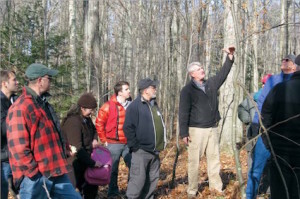Selling Carbon Offsets
A Potential Source of Funding For Forest Conservation
By Elizabeth L. Wroblicka, Esq.
Saving Land Magazine – Spring 2014
 “New sources of funding for land conservation are needed as land trusts grapple with the loss of public acquisition dollars and worry about having picked all of the low-hanging land and easement donations. Land trusts are thinking more broadly in terms of part- ners and innovative methods to protect open space in the 21st century. The burgeoning carbon offsets market for forest projects, while sometimes complicated and potentially risky, offers much for land trusts looking for new opportunities to conserve land….”
“New sources of funding for land conservation are needed as land trusts grapple with the loss of public acquisition dollars and worry about having picked all of the low-hanging land and easement donations. Land trusts are thinking more broadly in terms of part- ners and innovative methods to protect open space in the 21st century. The burgeoning carbon offsets market for forest projects, while sometimes complicated and potentially risky, offers much for land trusts looking for new opportunities to conserve land….”
“…Pacific Forest Trust (PFT), based in San Francisco, a leader in developing policies for GHG reductions through forest conservation and sustainable management, was an early participant in the California carbon offsets market. In 2002, PFT began managing 2,200 acres of redwood forest in Humboldt County, California, owned by the Van Eck Forest Foundation. PFT knew that participating in the carbon offsets market was synergistic with their long-term forest management goals.
The Van Eck Forest Project became the first forest project registered under California’s voluntary offsets market. In addition to protecting significant habitat and restoring a native redwood ecosystem, the emissions reductions generated by the project represent the equivalent of taking 123,000 cars off the road for a year. From 2005 to 2009, the Van Eck Forest Project earned $2 million from the sale of carbon offsets. This revenue more than covered all project development and operating expenses, as well as returning substantial income to the landowner.
Laurie Wayburn, PFT’s president and co-founder, remarks, “Having led the development of the policy and protocols enabling forest carbon offsets, we wanted to illustrate how these projects were done, what they cost and what the potential pitfalls were. Participating in the carbon offsets market is entirely consonant with what we normally do in terms of management plans, inventorying timber, monitoring growth and sustainable timber harvest. As the first project, a lot of learning was done on the Van Eck. It really showed us the compatibility of long-term conservation management and ecosystem services markets. It particularly shows how we can reverse the loss of forest carbon—which is the second largest source of CO2 globally.”
PFT is in the midst of transitioning the Van Eck Forest Project to a compliance offsets project. The result will mean that future sales of carbon offsets from the Van Eck Forest will yield better prices. PFT has subsequently helped landowners and land trusts across the United States develop and register offsets projects for the California market.”
